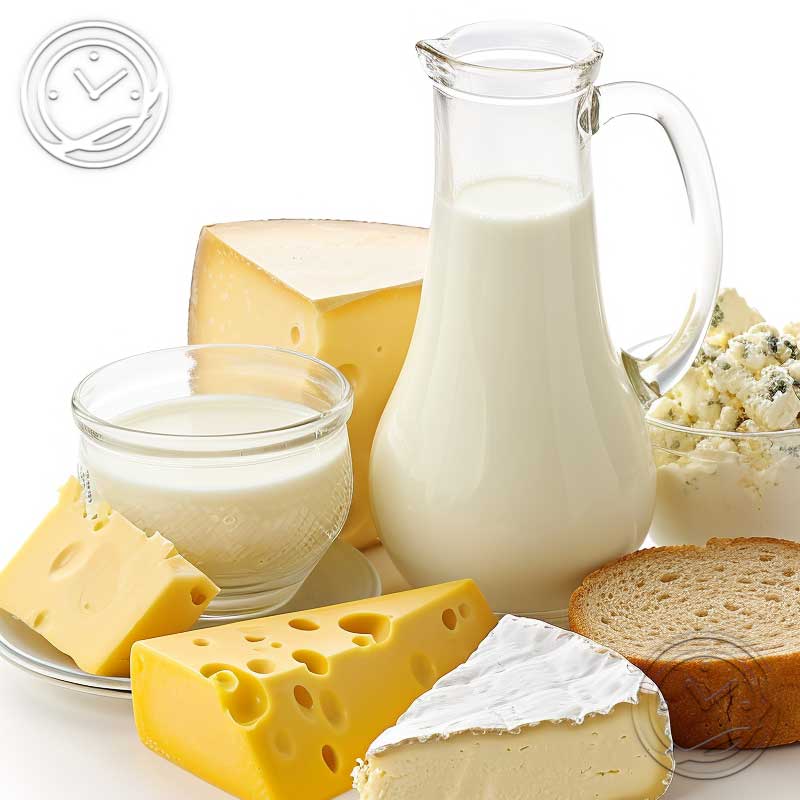Introduction to the Mediterranean Diet
The Mediterranean diet is a healthy eating pattern that is based on the traditional foods of countries around the Mediterranean Sea. It is characterized by high intakes of fruits, vegetables, whole grains, nuts, seeds, and olive oil, and moderate intakes of fish, poultry, and dairy products.
The Mediterranean diet has been shown to have a number of health benefits, including reducing the risk of heart disease, stroke, type 2 diabetes, and some types of cancer. It is also associated with a longer life expectancy.
If you are interested in trying the Mediterranean diet, there are a number of resources available to help you get started. You can find recipes, meal plans, and tips online and in cookbooks. You can also join a Mediterranean diet support group or find a nutritionist who can help you make the transition to this healthy eating pattern.
What is Dairy?
Dairy products are made from the milk of cows, goats, sheep, and other animals. They include milk, yogurt, cheese, butter, and ice cream. Dairy products are a good source of protein, calcium, and other nutrients. However, they can also be high in saturated fat and cholesterol.
The Mediterranean diet is a healthy diet that is based on fruits, vegetables, whole grains, and fish. It is low in saturated fat and cholesterol. Some people wonder if dairy products are allowed on the Mediterranean diet.
The answer is yes, dairy products can be part of the Mediterranean diet. However, it is important to choose low-fat dairy products, such as skim milk, low-fat yogurt, and low-fat cheese.
Dairy products can provide the Mediterranean diet with essential nutrients, such as protein, calcium, and vitamin D. However, it is important to choose low-fat dairy products to avoid consuming too much saturated fat and cholesterol.
Is Canola Oil a Fit for Mediterranean Diet?
Let's uncover a world where heart-healthy fats reign supreme, with olive oil often taking the crown. But what about the…
Can You Have Dairy on the Mediterranean Diet?
The Mediterranean diet is a healthy eating pattern that is based on the traditional foods of countries around the Mediterranean Sea. It is rich in fruits, vegetables, whole grains, nuts, and olive oil, and it emphasizes moderate amounts of fish, poultry, and dairy products.
Dairy products are a good source of calcium, protein, and other nutrients. However, some people on the Mediterranean diet choose to limit their intake of dairy products because they are concerned about the saturated fat content or because they are lactose intolerant.
If you are following the Mediterranean diet, you can still enjoy dairy products in moderation. Choose low-fat or nonfat dairy products, and limit your intake to no more than two to three servings per day.
Here are some tips for incorporating dairy products into the Mediterranean diet:
- Choose low-fat or nonfat dairy products.
- Limit your intake of dairy products to no more than two to three servings per day.
- Enjoy dairy products as part of a healthy meal or snack.
- Pair dairy products with fruits, vegetables, whole grains, or nuts.
If you are lactose intolerant, there are still many ways to enjoy the benefits of dairy products on the Mediterranean diet. You can try lactose-free milk, yogurt, or cheese. You can also make your own dairy-free milk or yogurt using soy, almond, or oat milk.
The Mediterranean diet is a flexible eating pattern that can be customized to meet your individual needs and preferences. If you are looking for a healthy way to incorporate dairy products into your diet, the Mediterranean diet is a great option.

Types of Dairy Products
There are many different types of dairy products, including:
- Milk
- Yogurt
- Cheese
- Butter
- Cream
- Ice cream
- Milk powder
- Milk protein concentrate
- Milk protein isolate
- Casein
- Whey
- Lactose
How To Tell If Your Pasta Is Vegan
Discover the world of delicious vegan pasta with our guide! Whether you follow a plant-based diet or have dietary restrictions,…
Benefits
Dairy products are a good source of several nutrients, including calcium, protein, and vitamin D.
Calcium is essential for bone health and muscle function. Protein is necessary for building and repairing tissues. Vitamin D is important for immune function and bone health.
Dairy products can also provide other nutrients, such as potassium, phosphorus, and magnesium.
Studies have shown that people who consume dairy products regularly have a lower risk of developing osteoporosis, heart disease, and certain types of cancer.
However, it is important to note that some people may be lactose intolerant, which means they cannot digest lactose, a sugar found in dairy products.
If you are lactose intolerant, you can still enjoy the benefits of dairy products by choosing lactose-free milk, yogurt, and cheese.
Overall, dairy products are a healthy and nutritious part of a balanced diet.
Risks of Dairy Products
While dairy products can provide some health benefits, they also have some risks. These risks include:
- Allergies and intolerances
- Increased risk of heart disease
- Increased risk of obesity
- Increased risk of certain types of cancer
- Increased risk of type 2 diabetes
It is important to note that not everyone who consumes dairy products will experience these risks. However, it is important to be aware of them so that you can make informed decisions about your diet.
Discover the savory revolution that's changing the way we think about cheese! In a world dominated by the dairy industry,…
How to Incorporate Dairy into the Mediterranean Diet
The Mediterranean diet is a healthy eating pattern that is based on the traditional foods of Greece, Italy, and other countries in the Mediterranean region. It is characterized by its high intake of fruits, vegetables, whole grains, and healthy fats, and its low intake of red meat, processed foods, and added sugar.
Dairy products are a staple of the Mediterranean diet, and they can be a good source of calcium, protein, and other nutrients. However, some dairy products are high in saturated fat, which can increase your risk of heart disease.
If you are following the Mediterranean diet, it is best to choose low-fat or nonfat dairy products. You can also choose yogurt, kefir, or cottage cheese, which are lower in saturated fat than milk and cheese.
Here are some tips for incorporating dairy into the Mediterranean diet:
- Choose low-fat or nonfat dairy products.
- Limit your intake of whole-milk dairy products to no more than two servings per day.
- Choose yogurt, kefir, or cottage cheese, which are lower in saturated fat than milk and cheese.
- Add milk or yogurt to smoothies, oatmeal, or cereal.
- Use cheese as a topping for salads, pizzas, or sandwiches.
- Enjoy a glass of milk with your meal.
By following these tips, you can enjoy the benefits of dairy products without increasing your risk of heart disease.
Popular Dairy-Free Mediterranean Diet Recipes
Here are some popular dairy-free Mediterranean diet recipes:
Breakfast:
- Oatmeal with fruit and nuts
- Whole-wheat toast with avocado and tomato
- Yogurt with berries and granola
- Scrambled eggs with vegetables
Lunch:
- Salad with grilled chicken or tofu, vegetables, and olive oil dressing
- Soup with vegetables and beans
- Sandwich on whole-wheat bread with hummus, vegetables, and sprouts
- Wrap with grilled fish or tofu, vegetables, and salsa
Dinner:
- Fish or tofu with roasted vegetables
- Chicken or turkey with brown rice and vegetables
- Lentil soup with vegetables
- Vegetarian chili with beans and corn
Dessert:
- Fruit salad with yogurt and honey
- Baked apple with cinnamon and walnuts
- Chocolate mousse made with soy milk and cocoa powder
- Peanut butter and jelly sandwich on whole-wheat bread
Conclusion
The Mediterranean diet is a healthy diet that is rich in fruits, vegetables, whole grains, and healthy fats. Dairy products are not a part of the traditional Mediterranean diet, but they can be incorporated into the diet in moderation.
There are many benefits to eating dairy products, including providing calcium, protein, and other nutrients. However, there are also some risks associated with dairy consumption, such as the potential for lactose intolerance and dairy allergies.
Ultimately, the decision of whether or not to include dairy in the Mediterranean diet is a personal one. If you are considering adding dairy to your diet, talk to your doctor to make sure it is right for you.






